HE says he believes in 1Malaysia because he has really lived through it. A politician for 18 out of his 42 years, Datuk Dr Wee Ka Siong is currently MCA Youth chief and deputy education minister. He is also now the Member of Parliament for Ayer Hitam in Johor, but he still has fond memories of his kampung boy lifestyle in Malacca.
In a 19 July 2010 interview at KL Hilton between functions, Wee, who is known for his strong command of Bahasa Malaysia, English and Mandarin, tells The Nut Graph how his childhood and family have shaped his identity and views of Malaysia.
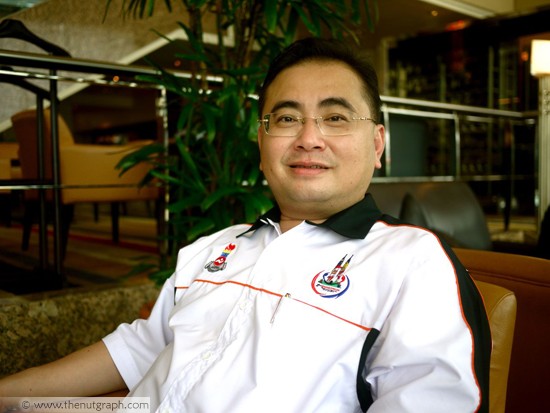
TNG: Where and when were you born?
Wee Ka Siong: I was born in Malacca [in 1968], in a small town called Jasin. We lived in Kampung Air Baruk, which is a Malay village, and where you had only five Chinese families.
I spent 18 years in Jasin, in that kampung house which was in front of a padi field. My childhood friends were Malay [Malaysians] and we used to play all sorts of games like “teng teng”. We also played badminton a lot, using wooden racquets. I was just a little kampung boy.
Can you trace your family tree?
My paternal grandfather came to Malaya at the age of 20 and I am a second-generation Malaysian. I have not been to China or my grandfather’s hometown, a city called Lu Feng in the Guang Dong province.
My grandfather started with a small sundry shop in the kampung, maintaining good relationships and a brotherhood with the neighbours who were mostly Malay. Because of that, my family was given the opportunity and privilege of renting on Malay reserve land for 40 years, at just RM5 a month. My grandfather was asked by the neighbours to stay and build a house there to ensure the sundry shop would remain; it gave them credit.
I still remember those 555 notebooks and I would take down credit records on them as a boy. My grandfather used to help the villagers, and so we always had good relationships with them.
My mother’s side is even more colourful. She was given to another family when she was just 40 days old, as she had too many sisters and there was gender discrimination at the time. My mother went to school for only seven months and she was a top student in Malacca. But she had to stop and look after the family when her sister-in-law developed a mental illness.
She would go around neighbours’ homes, charging five or 10 sen to deliver clean water in bamboo buckets. She is an iron lady, and also worked in the estate as a rubber tapper. She is a first-class Tamil speaker, and is also fluent in Telegu and Malayalam because she grew up in the Bukit Asahan estate, which was predominantly an Indian area.
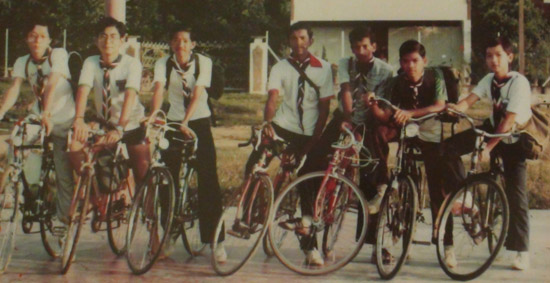
What are some of the memories or stories from your childhood that have stuck with you and why?
When I was a boy, my father used to fetch me from school using a motorbike and take me to his friend’s house. This friend was a blind man named Pak Cik Hussein. He was poor, and only made about RM1.50 a day making bamboo weaves and baskets.
My dad would spend about one and a half hours chatting with Pak Cik Hussein, and every time he went, he would bring some 30 sen bread or 50 sen kaya to the house. Sometimes my father would also go to the market to buy ikan kembong for his family. I remember when Pak Cik Hussein got married to another blind lady. We were all so happy, and it was as if our own family member was getting married.
It is a fond memory, that wedding day. In 1988 when I was studying in UTM (Universiti Teknologi Malaysia), I received a call from my family to say that my father got into an accident while travelling to meet Pak Cik Hussein. He was in a coma for a while, but thankfully came out of it and recovered. I feel he was blessed.
Why is that memory so significant to you?
Well, because there are still so many poor people out there who deserve help from others. At that time, my dad was just a smallholder, as my grandfather had some rubber estate. We were not rich, just a bit better off than others.
But when you have RM10 or RM20, you think about how RM1 or RM2 could really help out someone and [their] whole family. The self-satisfaction is something you cannot really describe in words. My grandfather used to remind us that we were on Malay reserve land for RM5, but that we could not just give RM5. He used to tell us, even after we shifted from there, that during Hari Raya we had to make sure we bought beef or mutton for the landlord. We did that for 40 years and were thankful.
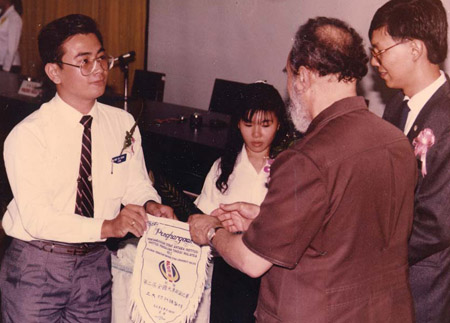
The villagers also relied on us as well. So there is that interdependence that is meaningful to me. I think it is because of my grandfather that my father did the kind things he did. A few years back, my father and I went back to see Pak Cik Hussein’s family, and I was happy that the children are all now going to university and working. I am not saying they are well-to-do, but when you see that they are better off, you feel such joy because they went through such hardship.
How has all this formed or shaped your identity as a Malaysian?
From day one I was in this multilingual environment. I was so impressed when my mother could speak Tamil with her Indian friends. I helped my parents when I was seven, rubber tapping in the estate. It was very difficult work.
Every time when it started to rain, you would hear people shout “Thamby, malawara!” That was the signal that it was going to rain, and to please run and collect the latex. From the estate we would ride the bicycle through the Malay kampung, where we had friends asking me, “Hey small boy, want to eat langsat or rambutan?” So I had a chance to mix around with all these friends as a kampung boy.
We played together at a young age and didn’t know any barriers. We learnt each other’s languages and it was all so natural. I have seen the hardships that the Chinese, Malays and Indians go through. And we would play football together as a team, where we always wanted the Indians to be strikers because they had strong legs and our Malay friends as the goalie because they were great at that.
I would grow up feeling that this was a true reflection of 1Malaysia, and the team spirit really made us feel that this was our kampung.
With such a multiracial past and such happy memories, are you disappointed now with the situation in schools?
My secondary school classmates are still all my buddies and I consider them my brothers and sisters till now. They are from all races and we are still close. We had multiracial study groups and knew each other’s families. But now, you seldom see this around. Even in secondary school, which is the perfect platform to mix around. I think we are losing this. The games are all now mono-ethnic as well. I used to play (sepak) takraw, and we would all play ping pong and badminton. But gone are the days.
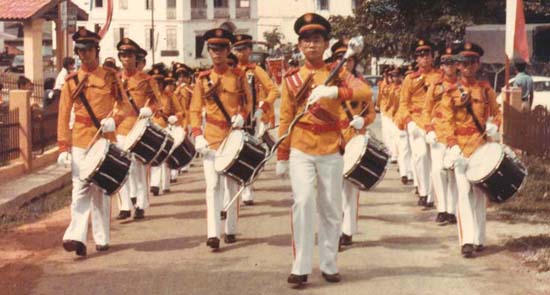
You are now in the Education Ministry, so you see this happening. What is being done [about it]?
We are trying our best to bring this mix back. When we organised sports days back in those days, as a scout leader I used to have members from all races helping to sell ice-cream in school. We collected money to save for our camping and other projects.
All of us learnt how to do business together. Now there is no more of this. So I used this as an example when I went back to my alma mater and spoke to the principal there. I told him that when I was a troupe leader, it was a really proud thing for me to know that more than 520 students out of the school’s 800 students were scouts.
Can you imagine [more than] 60% of the school population joining the same association, camping and cooking together? This is missing now. Unfortunately, now I think the kids are too pampered.
What, then, gives you hope in our Malaysia? What needs to be done?
We have to revive the spirit of oneness. When we go through hardships together, we can learn and design for the future. I think unity in diversity and inclusiveness are important in the 1Malaysia concept. “One” is not assimilation. That is not the true spirit of 1Malaysia.
When we played football or games back then, we would all automatically stop at 7pm because it was time for maghrib. From day one, we all knew that. Through activities like camping, we also learnt how to protect our juniors, and we had that sense of belonging as well.
Now, if you stay in Damansara, it is known that there are many Chinese [Malaysians] there, and in Shah Alam, there are many Malay [Malaysians]. Can we get a good mix? I think about the socialisation process, and I don’t believe that you can foster good relationships by just visiting each other here and there. I think it is cultivating that mind for oneness and the dedication to work together. It is not about tolerating anymore, and I think it is high time we elevate that into mutual understanding, respect and the appreciation of other people’s culture.
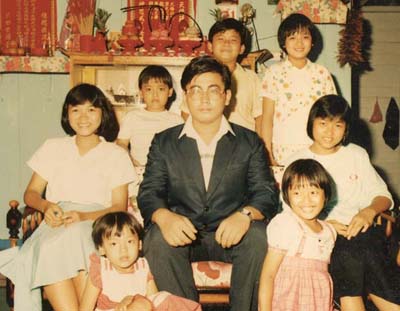
It must be that we think: “Put myself in their shoes, what would I think?” That is the highest level of appreciation. Malaysia is very rojak and ABC (ais batu campur), and despite all its problems, this great diversity gives me a lot of hope. ![]()
The Nut Graph needs your support


Ellese A says
Humbled by your background. I too miss the day when my two best friends were from the other two races. My children are deprived of this experience now. V sad.
Benny says
I am in my early 20s and gladly I am experiencing my own 1Malaysia, and yes I see my friends who are not experiencing it before my eyes. Being a Sarawakian really helps though. 🙂
Andrew I says
Well, from this interview, it sounds like you’re most likely in the wrong camp. If I were as multicultural as you, I wouldn’t be associated with a party whose constitution is based on looking after the interests of a particular race.
Secondly, this concept has been around a long time before 1Malaysia came along and, unless you’ve been living in a vacuum, you would have heard about it. Ask DAP, Guan Eng, in particular.
Please spare us. We’ve seen these tears before…on NTV7 news and Animal Planet.
Kong Kek Kuat says
Haha… I second Andrew I.
Oh, but wait a minute there dude: He´s NOT in the wrong party! […]
[…]
[…]
Anyway, being “multi-cultured” [what an over-used buzzword in Malaysia, these days] is not an essential condition to being a good Minister/Malaysian, but the acceptance of multiple cultures is. You have to accept that, for example, part of the characteristics of the majority of Malay-Malaysians is gracefulness, not laziness; that part of the characteristics of the majority of Chinese-Malaysians is competitiveness, not kiasu [whatever that made-up term means] or biadap. Willingness is not good enough. So, joining MCA or a political alliance which implicitly endorses racist/fascist acts just ain´t good enough.
Ultimately, I don´t want to know that you grew up in a Malay kampung, or your mother speaks first-class Tamil. Would you want to know that, as a voter, my god-mother is a Punjabi and she speaks fluent Fujian and Tamil in addition to English, Malay, and Punjabi? I don´t think so.
I want to know that you will fight for policies that will benefit my family and the family of all my friends (who come from many ethnic communities), AND Malaysians at large because poor Malaysians are bad for business and my quality of life. Of course, I will hope that the policies do not benefit my powerful competitors and enemies. But that´s the way it is — rather than hoping that you suffer because you are a Tutsi or a Jew.
Unfortunately, the general Malaysians — like the first commentator above, who´s “humbled” — are more interested in the story of the person rather than what the person can do.
ben says
Hear hear.
Your words does help ring an alarm in me, a soon-to-be voter, to not take stories at face value. again. =D
Cheers.
Ellese says
Very arrogant indeed. Very condescending too. You think you are the only person who is right, don’t you. You perceive that the ‘general Malaysian’ is stupid, do you?
The heck you are. All you can think of is what benefits you and what does not benefit your enemies. Totally kiasu. […]
Andrew I says
“You perceive that the general Malaysian is stupid, do you?” Posing a loaded question is a defeatist response.
Nevertheless, to answer your question, no. Not stupid, but naive by choice. The good news is the numbers are dwindling, thereby making it harder for politicians, from both sides of the political divide, to run a fast one by you.
After all, we don’t want to replace oil with grease.
Kong Kek Kuat says
@ Andrew I
Actually, I wasn´t targeting the “general Malaysian” but “the general Malaysian — LIKE the first commentator”.
There is a big difference if you take note.
Kong Kek Kuat says
@ Ellese A
Oh, but you are always more right.
“Condescending”? I’m glad you noticed!
Ellese says
I didn’t know you replied but thanks for Andrew’s and kkk’s reply as i had a good laugh. […] And the funny thing is that you two have the gall to call people naive when you are one.
I think when a person judges another person without checking their background he is not only utterly naive but stupid. It’s like interviewing an employee and telling them I don’t care about your background but you tell me what you can do for me. You end up with all kinds of criminals, etc etc. Like we end up with some MPs who cannot talk in Parliament because they can’t speak BM or MPs who jump ship all the time or an MP who cons thousands of people in one day by fighting Zionism and on another day apologises for being anti Zionism before his Jewish friends.
Funny isn’t it. You must check one’s background to understand a person. You can then see how he thinks. See his principles. See who his friends are. Etc etc. Everyone in the world does a background check. Even in the US. Then people connect on similar values and goals. Isn’t this basic? Everybody does that but perhaps these two. Either they are utterly naive or blindly partisan- just cannot see the good in people.
Andrew I says
Note to editor: please add comment below.
As pointed out by Hong Kong-based comedian, Russell Peters, it’s all about being a man.
Bigjoe says
I can give you thousands of stories like this from non-major states like Terengganu, Kedah, Kelantan, Penang and even Perak, etc..
For most of them, they opted to take the hardest route which is to choose to pursue academic and foreign education and migration. Those who chose politics like him is because they did not have the academic [qualification], talent or foresight to overcome huge hurdles. The reason people like him chose politics is because he could or did not leave.
D'evil says
I have no interest in the past. This guy is seduced by the dark side of the force. Like the story in Star Wars, he is Anakin who became Darth Vader.
Ramlah Ramadan says
@KKK: ‘Kiasu’ is not a made-up word, but originates from the Hokkien, and roughly means ‘afraid to lose’. It has connotations of cutthroat competitiveness and ruthless self-interest, often manifested in anti-social behaviour. The fact that it is an epithet conjured by the Chinese to describe themselves means that it is not some kind of racist designation imposed on them by the non-Chinese.
Kong Kek Kuat says
@ Ramlah Ramadan
“Kiasu” also means “afraid of problems” in Hokkien. But I bet you didn’t know that.
So which one meaning is it?
FYI: “The Chinese” did not “conjure” this epithet to describe themselves, but it started around 1992-1994 with some [I think] groups of Chinese-Singaporeans using the term as a slang for fellow Singaporeans who are highly competitive in their studies and career, and not for anti-social behaviour. The Chinese-Malaysians who are Singaporean-haters later adopted it as a pejorative against the Singaporeans.
I stand corrected by a contemporary historian.
Please don´t insult the PRCs by comparing them with those peasant aunties climb the buffet tables at corporate AGMs just to grab a couple of F.O.C. chicken wings for themselves. The PRCs are generally unlike any of our Chinese-Malaysians.
Andrew I says
@ Ellese
It isn’t a good idea to lump people together and throw generalisations at them either.
Have I been naive? I considered this interview and asked a very simple question. How does he reconcile his multi-ethnic upbringing with the constitution of the the party which he now belongs to?
Blindly partisan? I said: “politicians from BOTH sides of the political divide”.
There are parties which take their mottos seriously. Consider how quickly action was taken in the support letters controversy in Selangor. If this is to show us voters that they mean what they say, isn’t that all the better for us? We don’t even have to ask.
Reminds me of those wonderful before-bedtime chocolates they place under your pillow in some hotel rooms. 🙂
Kong Kek Kuat says
@ Ellese A
I didn´t know that you too look to the West for guidance when you argue with Asians. So much for ketuanan Melayu…
Anyway, when people say, “do a background-check”, they mean to check if a person has any record or conduct which might affect or conflict with the purpose for which that person is employed to do.
And when one wishes to understand another, understand his principles, one engages in civilised conversations with that person, as well as analysing that person´s conduct (as Andrew I says, “it´s all about being a man”).
A background-check is definitely not to sibuk [“See who his friends are”?? Really?], be humbled, or be blown away — which is really shallow.
Going by your logic (and I´m not sure if it is one), Wee Ka Siong should be UMNO Youth Chief — because even Khairy didn’t humble you.
Am I being condescending enough?
BTW, I have NEVER EVER heard of any Malaysian MP who can´t speak Malay. I´m sure the readers here would love to know who they are. Would you mind listing at least one of their names here?
Thanks!
Andrew I says
Or is it on the bed?
Andrew I says
Or the pillow
Prap says
I was a schoolmate of Datuk Wee, one year his junior. All that he mentioned above is truly correct. He was an extremely smart student, and we had all known that he would eventually become a politician or a high-flying personality. He was the head boy of SMDB (our school) and was always a considerate and caring character. Almost everyone in Jasin town knows him. I had lost touch with him after our school days and hoped that one day I’d be able to get in touch with him, not for the sake of his being a minister now, but because he was a very good friend. Cheers Datuk Wee, may God bless you.